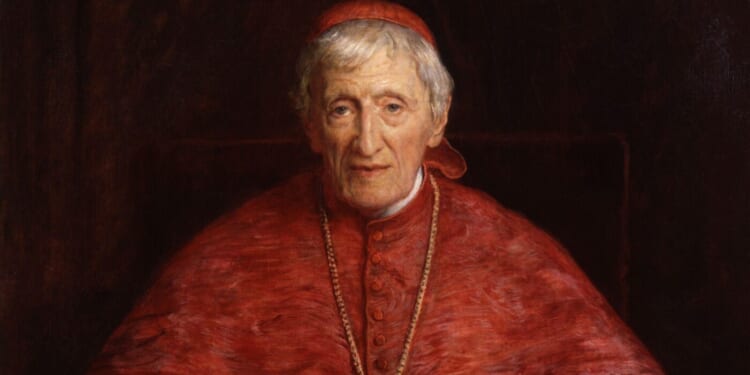I feel so alone!
This aching cry—whispered in a hospital bed, shouted in despair, or left unspoken in a sleepless night—asks a simple question: Is anyone really there? Many of us have witnessed this plea, and perhaps even felt it ourselves. In a world of fewer shared meals, less face-to-face conversation, and heavy reliance on texting and social media, loneliness has become epidemic.
Empathy shines as a quiet light. Society values it as a sign of friendship and leadership, but faith reveals a deeper truth: attentiveness to others’ hearts is a spiritual gift. St. John Henry exemplifies this, offering guidance both practical and profound.
Canonized in 2019, he was recently named a Doctor of the Church—an honor reserved for saints whose teaching holds lasting value for all Christians. He did not seek recognition, yet his faithfulness in trial led the Church to honor his teachings. Once a celebrated Anglican priest, he became Catholic in 1845, a step that brought misunderstanding, suspicion, and rejection from those closest to him. Such trials weighed heavily on a man of deep sensitivity.
Heightened emotional awareness is a double-edged gift. It brings joy—the delight of deep friendships—but also sorrow—the pain of rejection. St. John Henry experienced both. His words, heartfelt and personal, still reach us today, reflecting the depth of his experience.
He carried deep sorrow even from the family that had once been his whole world. As children, he and his siblings were inseparable. That closeness made later losses all the more painful. Once he converted, his sisters Harriet and Jemima would not welcome him, Catholic “papist” that he was, though he remained in contact with Jemima. Harriet’s conscience prevented her from communicating with him, and St. John Henry believed calumnies surrounding him contributed to her death in 1852.
Frank resented John’s conversion and embraced Unitarianism. Charles likely suffered from mental illness, a cross that St. John Henry bore throughout his brother’s life. His sorrow deepened by never seeing his nephews and nieces grow up—a quiet, enduring ache.
Rejection extended beyond family. To follow his conscience, he resigned from his beloved post at Oriel College, Oxford, giving up prestige and intellectual friends who delighted him. Within the Church, he sometimes faced suspicion and opposition. Pope Pius IX’s chamberlain openly opposed him, spreading calumnies that strained his relationship with Rome. Certain Catholic leaders blocked his teaching at times and limited his influence.
Through it all, St. John Henry bore his burdens with faith. He counseled patience and trust in God’s providence, writing that God is the great remedy and avenger of all wrongs: He works for those who do not work for themselves. Rather than retreat into bitterness, he allowed suffering to refine his care for others and deepen his reliance on God. His capacity to empathize, tested by trial, became a grace-filled ability to feel with others without being consumed—a model for all who witness or endure loneliness, misunderstanding, and hidden wounds.
Today’s World and the New Doctor
His trials shed light on our own age, where many carry hidden burdens. Family breakdown, social pressures, and the loneliness of following one’s conscience leave many emotionally fragile.
Modern life stretches our hearts in opposite directions: it makes us easily wounded by slights while opening us to the struggles of others. Social media magnifies both sides, constantly exposing us to curated highlights and opinions, fueling comparison and fragility, yet expanding our awareness of others’ struggles and drawing out empathy. This dual effect brings danger and opportunity, creating a context in which St. John Henry’s guidance remains deeply relevant.
Amid these tensions, St. John Henry offers guidance. He speaks to mind and heart. His capacity to feel deeply, tested by trial, became spiritual strength. Rather than withdraw into bitterness, he allowed suffering to deepen his care for others and reliance on God. This refined ability to connect with others was no mere sentimentality but a grace-filled skill.
His writings invite us to the same path. Catholics become increasingly aware of God’s presence and the spiritual companions surrounding them—patron saints, guardian angels, and the Blessed Virgin Mary. What once seemed distant becomes personal, as life is seen within a communion where heaven and earth are mysteriously intertwined. Above all, we grow attuned to the indwelling presence of the Triune God.
This deep spirituality was recognized when Pope Leo XIII elevated him to the cardinalate. St. John Henry chose the motto Cor ad cor loquitur—“Heart speaks to heart.” He longed to receive inspirations from the Sacred Heart and to pass them on, covered with Christ’s love—a mission that still speaks today. In a world where loneliness is epidemic, those naturally empathetic feel it keenly. Those not naturally sensitive can find guidance in his example: St. John Henry’s confidence that God speaks to every human heart reminds us that none of us is ever truly alone.
Reflecting this truth, Pope Francis, at St. John Henry’s canonization in 2019, highlighted his meditation on the holiness of daily life:
The Christian has a deep, silent, hidden peace, which the world sees not…The Christian is cheerful, easy, kind, gentle, courteous, candid, and unassuming; has no pretense…with so little that is unusual or striking in his bearing that he may easily be taken at first sight for an ordinary man.
Such holiness becomes a kindly light in the darkness, offering guidance amid life’s trials. It reminds us that even in moments of loneliness or struggle, God’s presence sustains and comforts. Newman himself prayed: “Jesus, stay with me, and then I shall begin to shine as Thou shinest: so to shine as to be a light to others.”
Do we see ourselves as ordinary, yet called to shine with His light? St. John Henry speaks to the hidden center of our hearts, where God dwells and decisions are made. He addresses the restlessness of our age, offering peace and a way forward.
Many today are rediscovering his writings. Through meditative reading, they find clarity and companionship with a saint who walks beside them. In a fragmented culture hungry for authenticity, his voice reassures us that holiness is not escape from life but the transfiguring of it.
How to Let St. John Henry Newman Be Your Companion
To welcome St. John Henry into your life, read his writings slowly and prayerfully, noticing how he speaks to the heart. Invite him into daily life through small acts: ask for his intercession in loneliness, meditate on his example when facing difficult decisions, and imitate his attentiveness to God and others.
For deeper exploration, his meditations and sermons are freely available at NewmanReader.com. The IHM website also provides reflections here: “Heart Speaks to Heart.”
In these ways, his heart can meet yours, offering guidance, consolation, and the courage to live with faith and love.
Image from Wikimedia Commons










